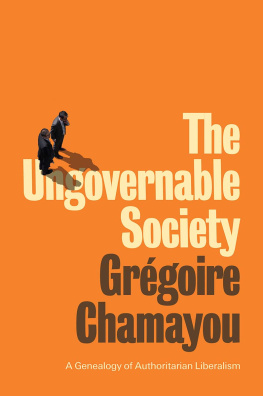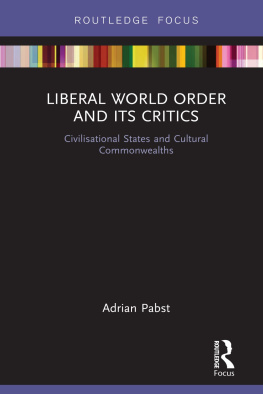
The Ungovernable Society
A Genealogy of Authoritarian Liberalism
Grgoire Chamayou
Translated by Andrew Brown
polity
Originally published as La socit ingouvernable La Fabrique ditions, 2018

This English edition 2021 by Polity Press
This book is supported by the Institut franais (Royaume-Uni) as part of the Burgess programme.
This work received the French Voices Award for excellence in publication and translation. French Voices is a program created and funded by the French Embassy in the United States and FACE Foundation (French American Cultural Exchange). French Voices Logo designed by Serge Bloch.
Illustrations from R. Edward Freeman, Strategic Management: A Stakeholder Approach Cambridge University Press, 2010, reproduced with permission of Cambridge University Press through PLSclear.
Polity Press
65 Bridge Street
Cambridge CB2 1UR, UK
Polity Press
101 Station Landing
Suite 300
Medford, MA 02155, USA
All rights reserved. Except for the quotation of short passages for the purpose of criticism and review, no part of this publication may be reproduced, stored in a retrieval system or transmitted, in any form or by any means, electronic, mechanical, photocopying, recording or otherwise, without the prior permission of the publisher.
ISBN-13: 978-1-5095-4202-4
A catalogue record for this book is available from the British Library.
Library of Congress Cataloging-in-Publication Data
Names: Chamayou, Grgoire, author. | Brown, Andrew, translator.
Title: The ungovernable society : a genealogy of authoritarian liberalism / Grgoire Chamayou ; translated by Andrew Brown.
Other titles: Socit ingouvernable. English
Description: Medford : Polity Press, 2021. | Includes bibliographical references and index. | Summary: A brilliant work that shows how the political contours of our contemporary neoliberal societies took shape in the crisis-laden decade of the 1970s-- Provided by publisher. Identifiers: LCCN 2020032896 (print) | LCCN 2020032897 (ebook) | ISBN 9781509542000 (hardback) | ISBN 9781509542017 (paperback) | ISBN 9781509542024 (epub)
Subjects: LCSH: Free enterprise--History. | Capitalism--History. | Liberalism--History. | Labor discipline--History.
Classification: LCC HB95 .C47613 2021(print) | LCC HB95(ebook) | DDC 330.12/2--dc23
LC record available at https://lccn.loc.gov/2020032896
LC ebook record available at https://lccn.loc.gov/2020032897
The publisher has used its best endeavours to ensure that the URLs for external websites referred to in this book are correct and active at the time of going to press. However, the publisher has no responsibility for the websites and can make no guarantee that a site will remain live or that the content is or will remain appropriate.
Every effort has been made to trace all copyright holders, but if any have been overlooked the publisher will be pleased to include any necessary credits in any subsequent reprint or edition.
For further information on Polity, visit our website: politybooks.com
FOREWORD
Grgoire Chamayous book should be read as an important contribution to the study of neoliberalism or whatever we are to call the great renewal of reactionary thought that emerged in the 1970s and still dominates our society today. In fact, he contributes to the literature on neoliberalism while simultaneously rejecting that term neoliberalism itself or, rather, fundamentally reorienting our understanding of it.
Chamayou accomplishes this reorientation, in part, by giving voice and priority to intellectual and political figures that have largely been left out of the standard accounts. He orchestrates wonderfully the conservative and reactionary chorus in the United States in the battle of ideas that in the 1970s arrived at a new hegemony. He does, of course, engage with and give insightful interpretations of the well-known protagonists of neoliberal economics, such as Friedrich Hayek, Milton Friedman and James Buchanan. But the standard focus on such figures leads too often to a conception of neoliberalism as a single, coherent project. Chamayou demonstrates, instead, that the movement was profoundly heterogeneous.
In fact, one of the most innovative aspects of the book is, in my view, the way Chamayou delves deeply into the literature emerging in the 1970s on management and managerialism, which in many respects diverges significantly from neoliberal economics. Managers, business leaders and management theorists, rather than thinking only in economic terms, constructed a political project, opposing workplace democracy, for instance, in order to preserve the authority of the private government of the firm. Management theorists developed a practical, strategic conception of governance, no longer aimed internally within the individual business but instead oriented outward: an expansive notion of strategic management intended to govern also the social world outside of the firm, ruling over workers, shareholders, consumers and other social forces, as if in concentric waves. These lesser known authors of management theory are in Chamayous argument just as important as the well-known neoliberal economists, if not more so, in developing the new paradigm. By highlighting their perspective and their importance, he casts the entire project in a new light.
A second way that Chamayou reorients our understanding of this movement is by emphasizing its internally varied and political character. This is particularly apparent from the analyses of strategic management. Rather than analysing neoliberalism as a solely or even primarily economic project, we must grasp this heterogeneous project that is political at its core. Many authors have highlighted how neo-liberalism is intimately tied to authoritarian state policies, for instance in the Pinochet, Reagan and Thatcher governments. For Chamayou, however, the authoritarian rule that accompanies neoliberalism is not only or even primarily based in the state but instead the power of managers and the firm. Authoritarian liberalism is Chamayous preferred term to grasp the range of strategic deployments of power extending from state to business.
The political nature of the movement is made particularly evident by the repeating lament that Chamayou traces among management theorists: that the firm and society as a whole have become ungovernable. This plaintive cry echoes the evaluations of neoconservatives and neoliberals of the era. The management discourse against workplace democracy, for example, parallels Samuel Huntingtons well-known claim that democracy has gone too far and is no longer sustainable because it has allowed too many minorities to make demands on the state and on social resources. It is fascinating (and chilling) to see how in these conservative and reactionary circles in the 1970s, democracy is so willingly sacrificed in the name of governability, which takes the place of supreme value. In fact, the theorists, business leaders and politicians involved in these debates wield the fear of ungovernability as a weapon. Merely the threat of it served to legitimate and make appear inevitable the deployment of new structures of authority at all social levels. But that is not to imply that cynical business leaders and management theorists simply invented the threat to legitimate authority. No, it is important to keep in mind that pressures of social antagonisms, insubordination and indiscipline were very real in the 1970s.
Next page









